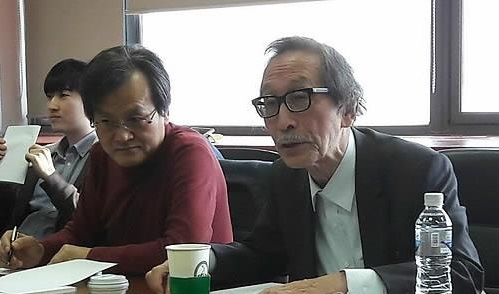A Japanese scholar on Thursday proposed the establishment of a memorial engraved with Prime Minister Shinzo Abe's latest apology over Japan's wartime sexual enslavement of Korean women.
Haruki Wada, an emeritus professor at Tokyo University and expert in Korean history, made the proposal during a forum in Seoul as a follow-up on a 2015 bilateral agreement to settle the long-standing dispute between the two neighbors.
 |
(Yonhap) |
"I think installing a memorial monument will be meaningful given the purpose of the project to recover the honor and heal the scars of victims, led by the Reconciliation and Healing Foundation," he said during the conference at Kookmin University in Seoul. "If that's done, it will leave (the settlement) in the memories of both countries' peoples."
With an aim to end their decades-long feud over the wartime atrocity, Seoul and Tokyo reached a landmark agreement on Dec. 28, 2015, under which Seoul launched the foundation with a 1 billion yen ($9 million) contribution from Japan.
The professor proposed the countries also include the next South Korean president's position in the engraving.
South Korea is set to hold an election to pick a new president on May 9 and the current front-runner Moon Jae-in has hinted at renegotiating the deal.
Critics in Seoul demand the cancellation of the accord, saying that the Japanese government still refuses to recognize its legal responsibility and denied the women were forcefully recruited to the front-line military brothels. The deal was reached even without consultation with the victims, they said.
Wada lauded the deal for its drawing of the 1-billion-yen fund from the Japanese government's budget and inclusion of an apology from Abe, but also criticized it for lacking an apology that could resonate with the victims. It also did not properly accept factual details of the wartime atrocity, he noted.
"But they are not defects (grave) enough to wholly negate Japan's apology and the fund contribution as a show of the apology," he said. "I hope South Koreans can accept the agreement."
If the deal is canceled in the end, he said, it will "inflict a psychological impact on Japanese people."
Demanding a new agreement with the Abe administration and calling on him to change his attitude toward history will be "meaningless," he also said, adding that rather, it will be more useful to leave the apology he has said on the monument. (Yonhap)








![[Today’s K-pop] Blackpink’s Jennie, Lisa invited to Coachella as solo acts](http://res.heraldm.com/phpwas/restmb_idxmake.php?idx=644&simg=/content/image/2024/11/21/20241121050099_0.jpg)